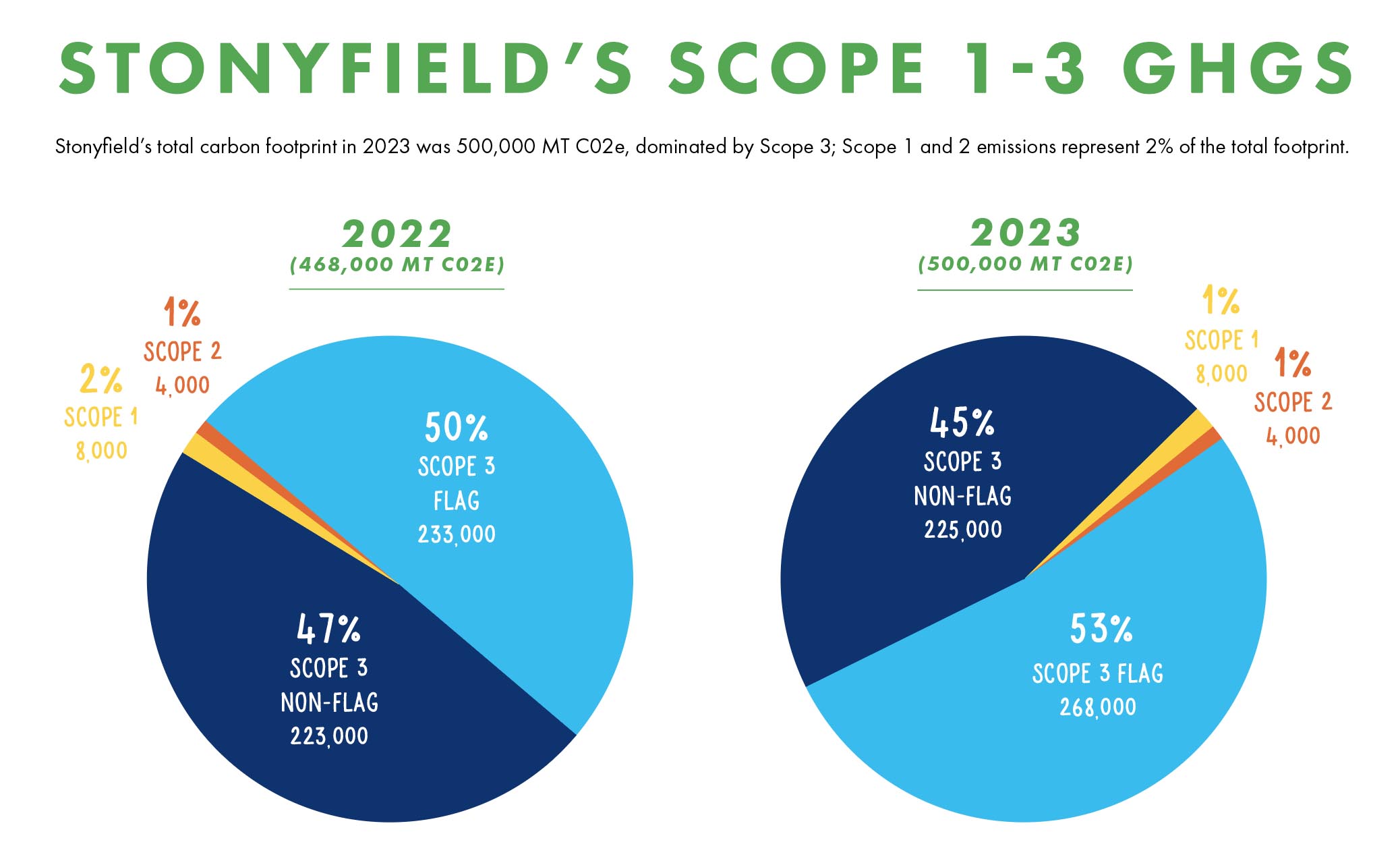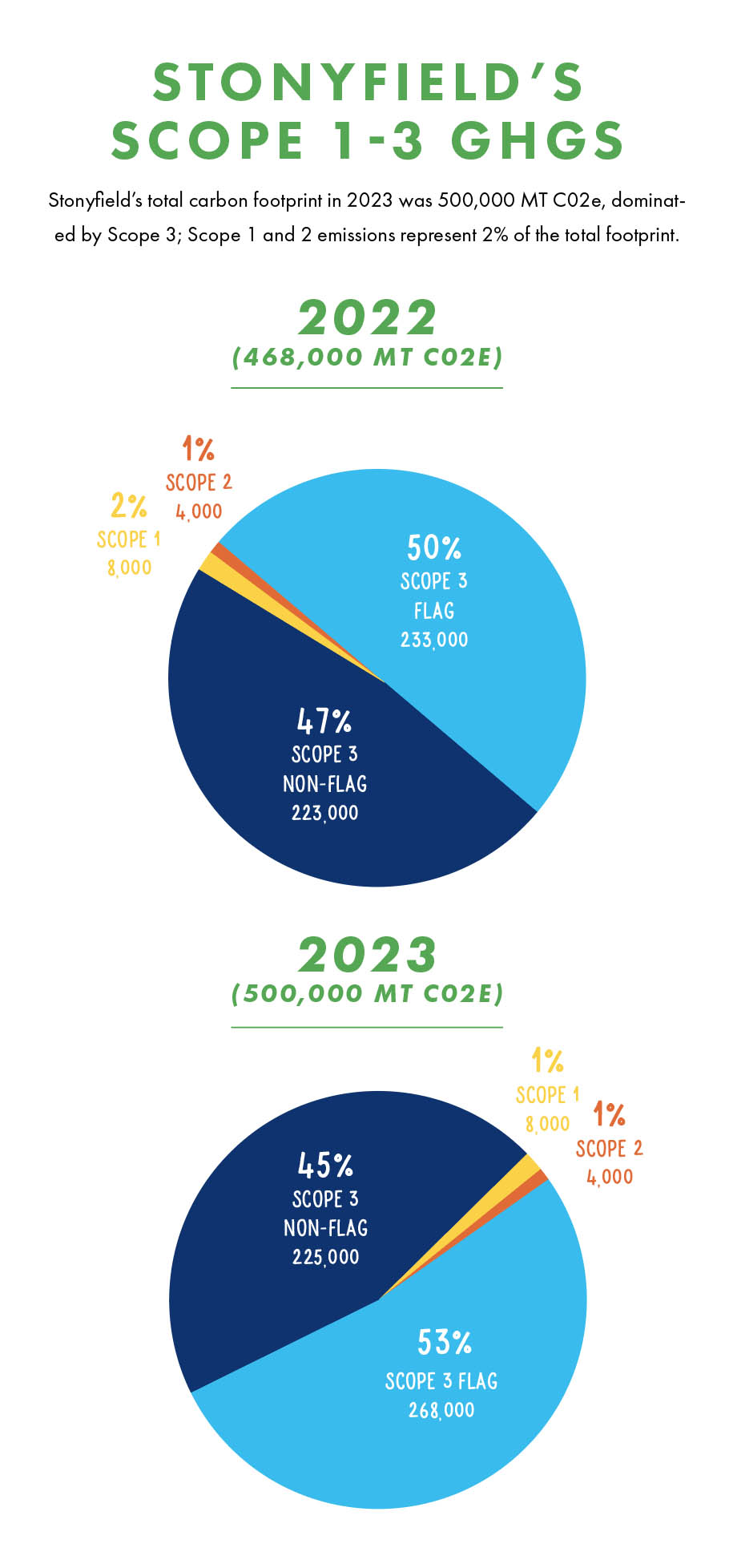As Stonyfield continues to grow, so does our commitment to healthy farms, healthy communities, and our planet. Nine new organic farms joined the Stonyfield family in 2024, adding thousands of acres of farmland where we boosted resources to promote animal welfare, protect workers, and maximize the environmental benefits of organic farming. Other new initiatives save energy and manage greenhouse-gas emissions at the farms and our factory. We also continue to push tirelessly for local and national policies that improve organic farming and protect our environment. In 2024, Stonyfield welcomed growth organically.
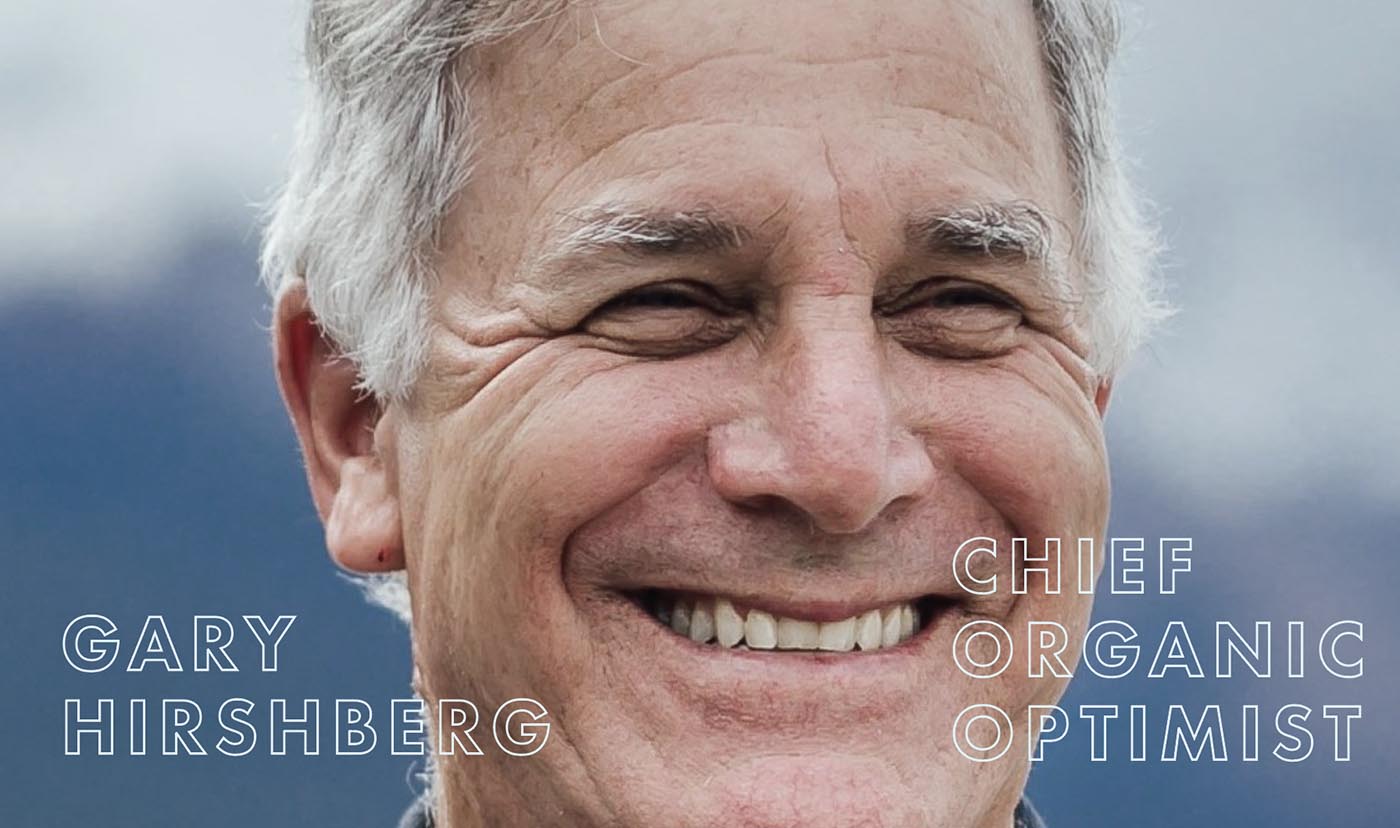
DOING GOOD IN BUSINESS FOR PEOPLE AND OUR PLANET
When Stonyfield got our start in 1983 there was no national organic standard. In fact, while we operated an organic, biodynamic farm and dairy, even we were not 3rd-party certified.
We started Stonyfield with the multiple missions of providing healthy, clean, nutritious foods, supporting economically and ecologically sustainable family farms, and educating consumers about their power to do good through conscientious purchasing. We helped model and pioneer a movement to use business as a force for good. And over time our loyal consumers helped us prove that this was possible. Today we have a national organic standard that helps ensure our products are produced without harmful pesticides, synthetic fertilizers, antibiotics, or added growth hormones. In 2016 we also became a certified B-Corp to help verify our social and environmental performance. We’re watching our government and some companies reverse course on climate change and sideline vital environmental initiatives. We are concerned with the cancellation of grants that support adoption of renewables and climate-smart agriculture, and protections of vital lands, waterways, and natural habitats.
At the same time, we’re seeing more and more impacts from climate change as our planet continues to warm, approaching the 1.5-degree-Celsius tipping point. Scientists predict more wildfires, extreme weather, and catastrophic biodiversity and ecosystem declines. These impacts threaten our communities, particularly our poorest and most vulnerable populations, and our ability to produce enough healthy foods. Now more than ever, companies need to redouble commitments to take positive action. It’s hard work, and progress isn’t always linear, but we are not wavering in our mission: More than 40 years later, we’re still here to make the world a better, healthier place, and to protect family farmers and future generations.
Sincerely, Gary Hirshberg, Co-Founder,
Chief Organic Optimist, Stonyfield

MORE ORGANIC FARMING, FEWER GREENHOUSE-GAS EMISSIONS PER ACRE
Welcome to Stonyfield’s 2024 Impact Report. The report explores our work capitalizing on the significant benefits of organic farming, making healthy food, and contributing to healthy farms, healthy communities, and a healthy planet. The opportunity to do more good increases as we continue to grow. This starts with the small organic farms that directly supply milk for our yogurt. Nine New England farms joined the Stonyfield family in 2024, expanding the organic farmland that directly supplies our milk from 16,000 acres to 20,000 acres.
Farms new to our family immediately receive seed money for farm improvements that are literally down in the weeds, ranging from new grain drills to solar installations. We work with all direct supplier farms to ensure they maintain proper animal welfare practices. In 2024, we developed a plan to assess fair labor conditions across our direct organic milk supply chain and ensure these conditions are being upheld at those farms.
We work so closely with our direct-supply organic farmers because that is where our company can make some of our most dramatic positive impacts. Around 98 percent of our carbon footprint doesn’t come from making yogurt but originates across the value chain of the business, like farming. Expanding organic farmland is a good start. Our own studies show organic dairy farms store around 37 tons of carbon per acre, suggesting that our direct suppliers are storing nearly 740,000 tons of carbon instead of it being in the air, warming our planet. Our 2024 Impact Report explores our work with direct-supply organic farms to reduce those greenhouse-gas emissions, improve energy efficiency at our flagship factory, shed plastic as we make our packaging more lightweight, and give back to the New England communities we call home, among other good work. At Stonyfield, we continually recommit ourselves to the benefits organic farming has for our health and our environment. It tastes the best too. I’m proud to share our work making healthy food and contributing to healthy communities and a healthy planet. And don’t forget the yogurt.
Sincerely, Bill Cassidy
Stonyfield CEO
MORE ORGANIC FARMS JOIN THE STONYFIELD FAMILY
Stonyfield prioritizes buying milk from a network of small New England organic farms we know and trust — like a family. These farmers share our commitment to organic because of its benefits for the environment, our health, and animal welfare. In 2024, we are happy to announce that nine New England organic farms joined our direct supply team. This expands the organic farmland managed by Stonyfield direct suppliers from 16,000 acres (about twice the area of Chicago O’Hare airport) to 20,000 acres (about the area of Cleveland, Ohio). Stonyfield provides significant support for small farms that join our family, including up to $4,000 of technical assistance each year for all kinds of improvements. We also help organic farms through the Northeast Organic Family Farm Partnership, which works to grow demand in the Northeast for organic dairy products made from organic dairy producers right here in our region. Our new supply farms are located within a few hours from our headquarters in New Hampshire.
“Nine New England organic farms joined the Stonyfield team in 2024. Welcome to the family!”
![]()


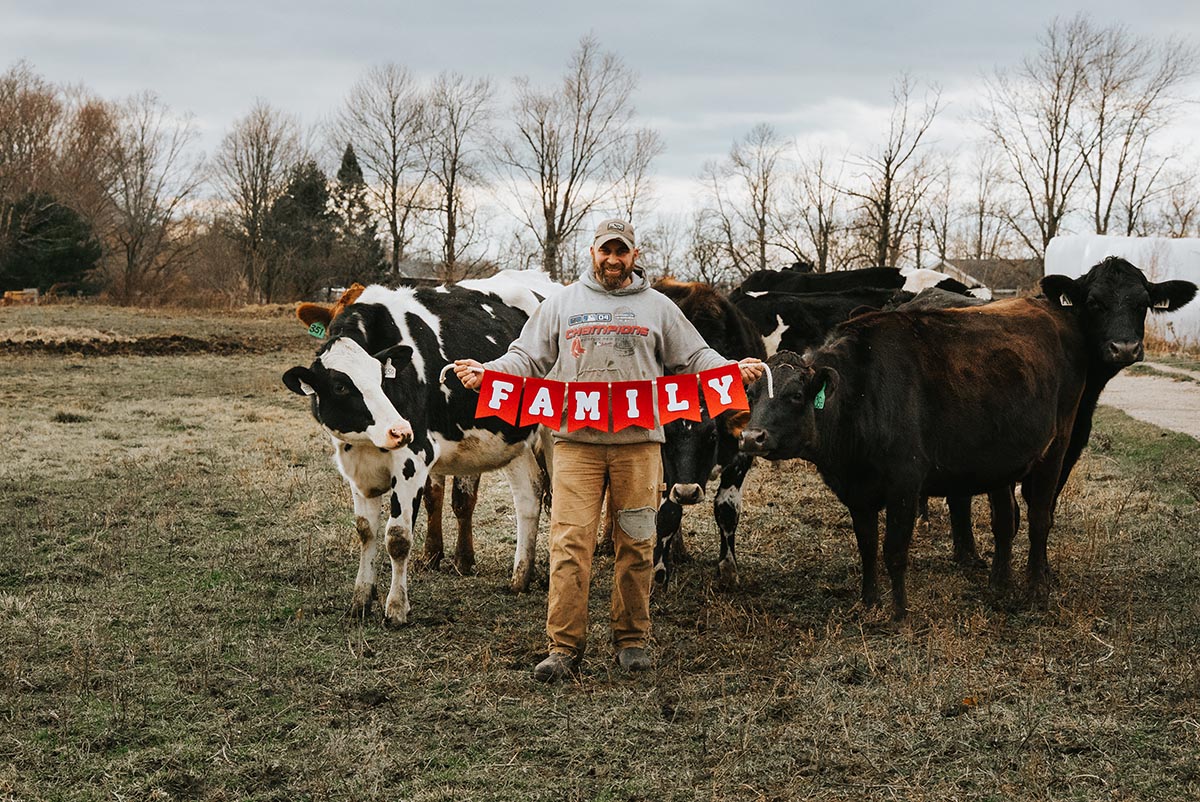
MORE ORGANIC FARMS JOIN THE STONYFIELD FAMILY
Stonyfield prioritizes buying milk from a network of small New England organic farms we know and trust — like a family. These farmers share our commitment to organic because of its benefits for the environment, our health, and animal welfare. In 2024, we are happy to announce that nine New England organic farms joined our direct supply team. This expands the organic farmland managed by Stonyfield direct suppliers from 16,000 acres (about twice the area of Chicago O’Hare airport) to 20,000 acres (about the area of Cleveland, Ohio). Stonyfield provides significant support for small farms that join our family, including up to $4,000 of technical assistance each year for all kinds of improvements. We also help organic farms through the Northeast Organic Family Farm Partnership, which works to grow demand in the Northeast for organic dairy products made from organic dairy producers right here in our region. Our new supply farms are located within a few hours from our headquarters in New Hampshire.


“Nine New England organic farms joined the Stonyfield team in 2024. Welcome to the family!”
![]()


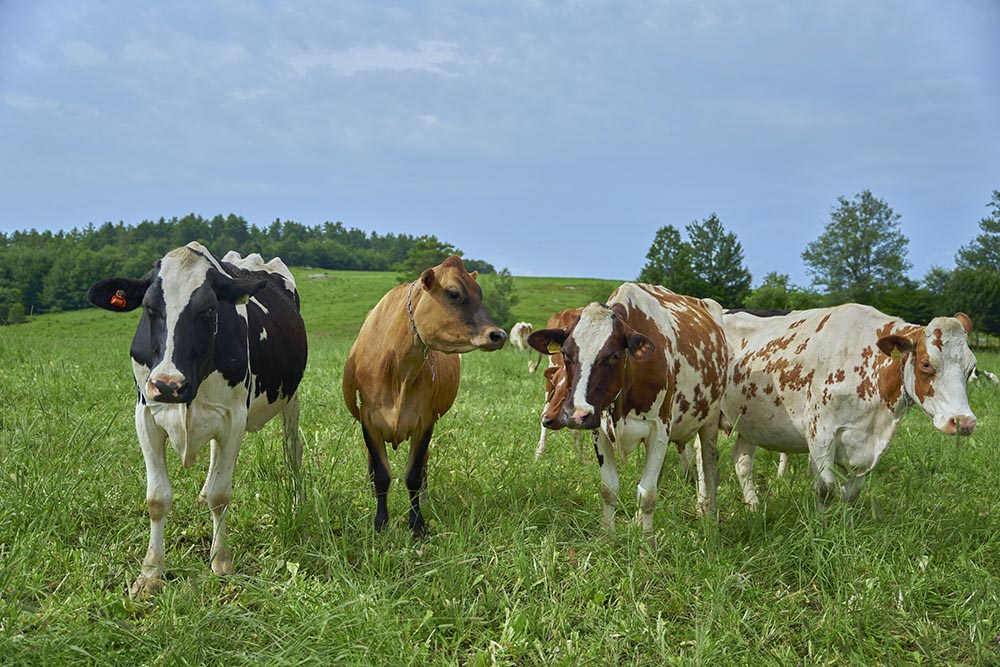
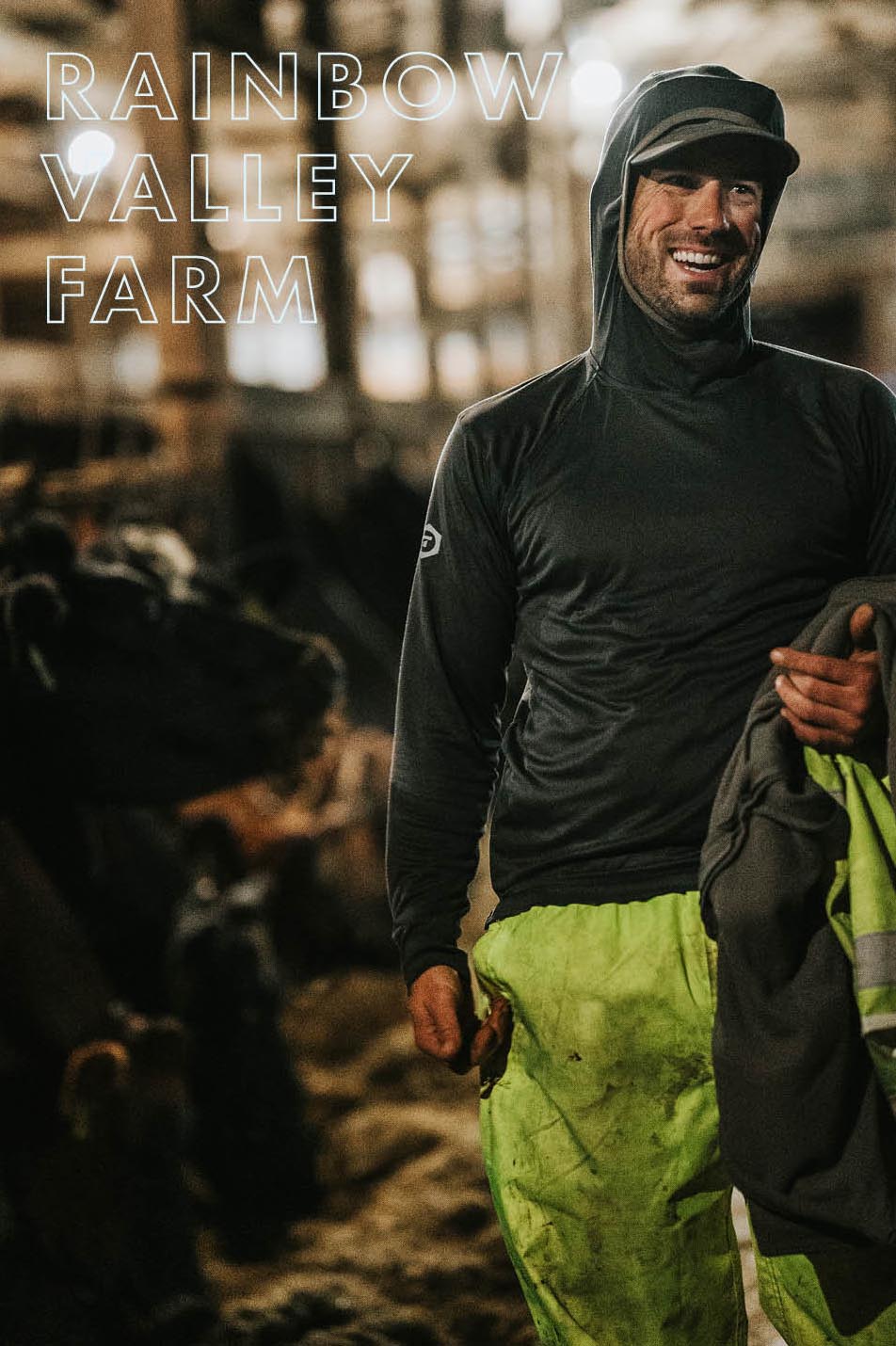
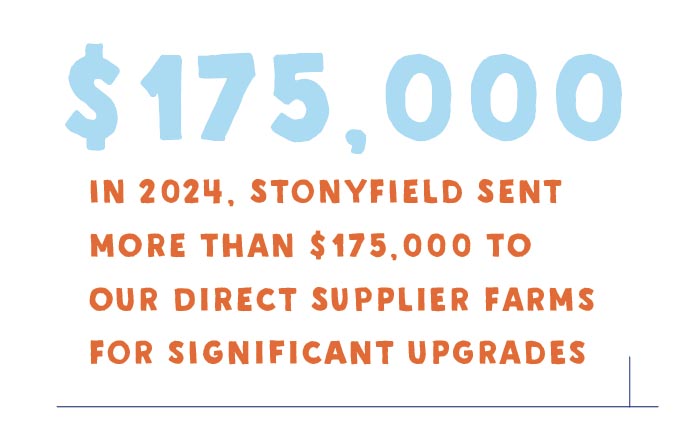
STONYFIELD HELPS WITH IMPROVEMENTS DOWN ON THE FARM
Stonyfield helps finance projects and initiatives that improve operations on organic farms that directly supply our milk. In 2024, we sent more than $175,000 to our direct supplier farms for big upgrades. Mayday Farm in Leeds, Maine, for example, got a grain drill for no-till seeding for their 90-acres of pasture. Rainbow Valley Farm built new stalls for the cows at their organic dairy farm in Sydney, Maine. Greg Beaudoin’s Farm in Jeffersonville, Vermont put up a solar installation. And Molly Brook Farm in Cabot, Vermont upgraded their pasture laneway to improve cow movement between pastures. When New England organic farmers work with us, they know they’ll have the support necessary to make essential annual upgrades to their farms.
“We believe in helping our direct supply farms make the investments they need to improve their business.”
![]()
STONYFIELD HELPS WITH IMPROVEMENTS DOWN ON THE FARM
Stonyfield helps finance projects and initiatives that improve operations on organic farms that directly supply our milk. In 2024, we sent more than $175,000 to our direct supplier farms for big upgrades. Mayday Farm in Leeds, Maine, for example, got a grain drill for no-till seeding for their 90-acres of pasture. Rainbow Valley Farm built new stalls for the cows at their organic dairy farm in Sydney, Maine. Greg Beaudoin’s Farm in Jeffersonville, Vermont put up a solar installation. And Molly Brook Farm in Cabot, Vermont upgraded their pasture laneway to improve cow movement between pastures. When New England organic farmers work with us, they know they’ll have the support necessary to make essential annual upgrades to their farms.




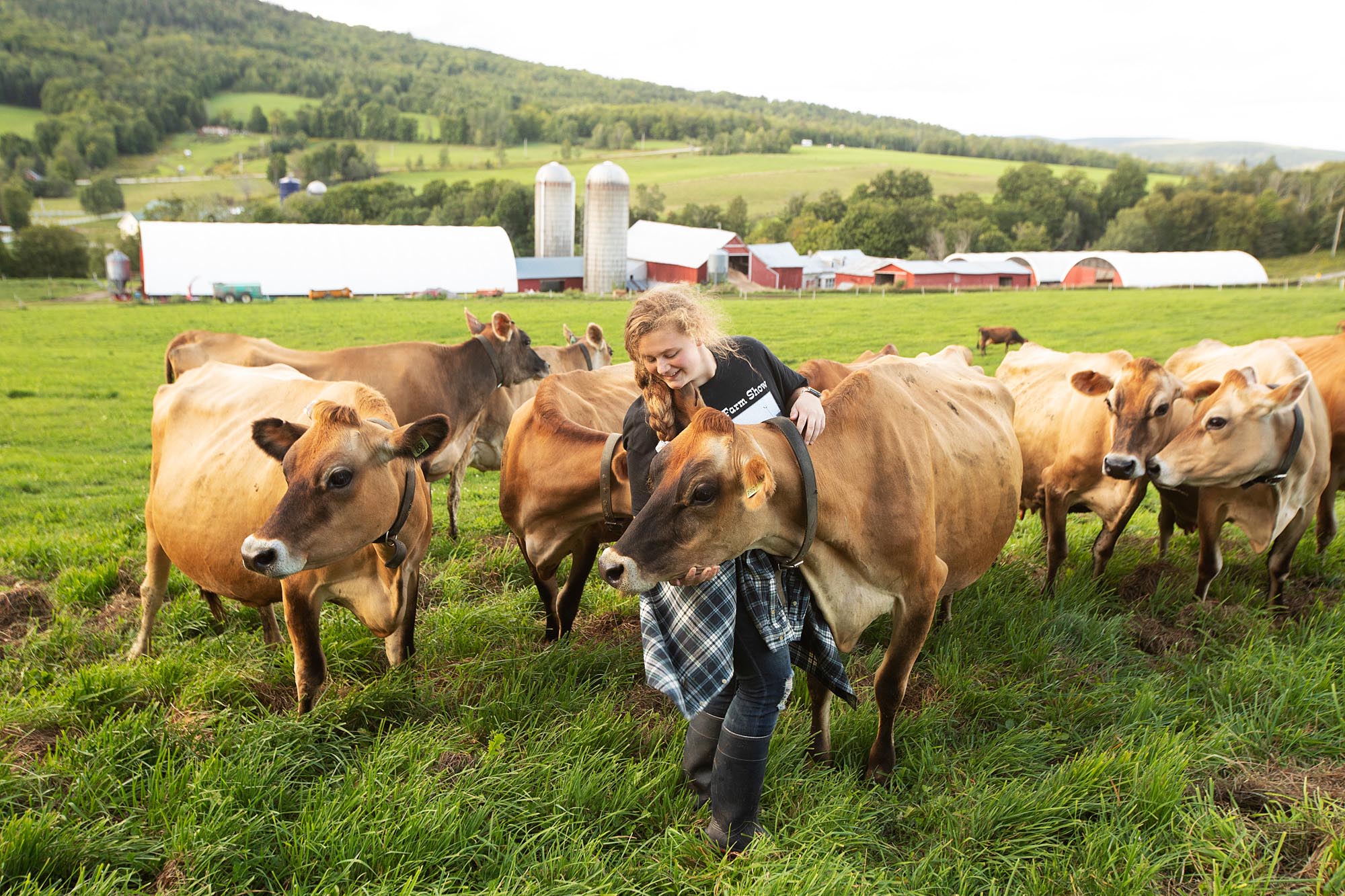
STONYFIELD’S ORGANIC SUPPLY CHAIN FOCUSES ON ANIMAL WELFARE
In 2024 we completed comprehensive checks to confirm that 100 percent of Stonyfield’s dairy technicians received training on proper animal welfare practices, completing a goal set for 2025. This ensures early compliance with basic animal welfare standards. We also set ambitious new animal welfare goals as our supply chain expands to include as many as 70 organic farms. Stonyfield has established an animal welfare dashboard to help the company monitor and meet these global corporate social responsibility standards. Everybody likes happy cows.
New factory lighting saves energy equal to 60 homes off the grid
In 2024 Stonyfield started retrofitting lighting at the Londonderry manufacturing facility, replacing fluorescent lighting on the production floor, in offices, labs, and warehouses with energy-efficient LED lights. The savings are significant: a 60 percent reduction in facility lighting energy use of 696,000 kilowatt hours every year, or the equivalent of taking over 60 homes off the U.S. energy grid. The new lighting is also better for our people, with brighter, more consistent light and less maintenance. I guess you could say, we bring good yogurt to light.
“We made sure the Stonyfield dairy technicians who work with the organic farms that supply our milk are trained in proper animal welfare practices — and we got it done a year ahead of schedule.”
![]()
STONYFIELD SUPPORTS FAIR LABOR ACROSS OUR ORGANIC SUPPLY CHAIN
Stonyfield strives to monitor and improve working conditions on its direct-supply organic farms. In 2024 we developed a plan to assess fair labor conditions across our direct-supply farms and ensure these conditions are being upheld. This includes human resources practices and proper safety management techniques to improve workers’ environment and conditions. In 2024 we performed the first pilot evaluations at two farms that directly supply our organic milk. An expansion of this program will show how we support all workers in our organic milk supplier network. Great yogurt starts with healthy, happy farmers.
BETTER POLICIES FOR BETTER ORGANIC FOOD
Stonyfield strongly advocates in favor of public policy to support organic farming, including vital research. In 2024, we worked successfully with Sen. Tammy Baldwin, D-Wis., to include support for organic farmers in the draft farm bill. Baldwin ensured that the bill draft included grants to develop organic market infrastructure, like food processing and storage, to help connect organic farmers with consumers. Although this farm bill draft ultimately did not pass in 2024, we will continue advocating for these kinds of policies. Despite majority opposition in Congress, we fought to preserve $20 billion set aside for climate-smart agriculture as part of the Inflation Reduction Act signed into law in 2022. Also in 2024, we helped convince the USDA to release a second round of funding to help support organic dairy farmers hit by high organic feed costs through the Organic Dairy Market Assistance Program. We will always work to improve rules and regulations that make great food even better.
“As environmental safeguards are rolled back across the country, the responsibility to protect our health and our planet falls more heavily on all of us. At Stonyfield, we remain steadfast in our commitment to healthy farms, healthy communities, and a healthy planet.”
![]()
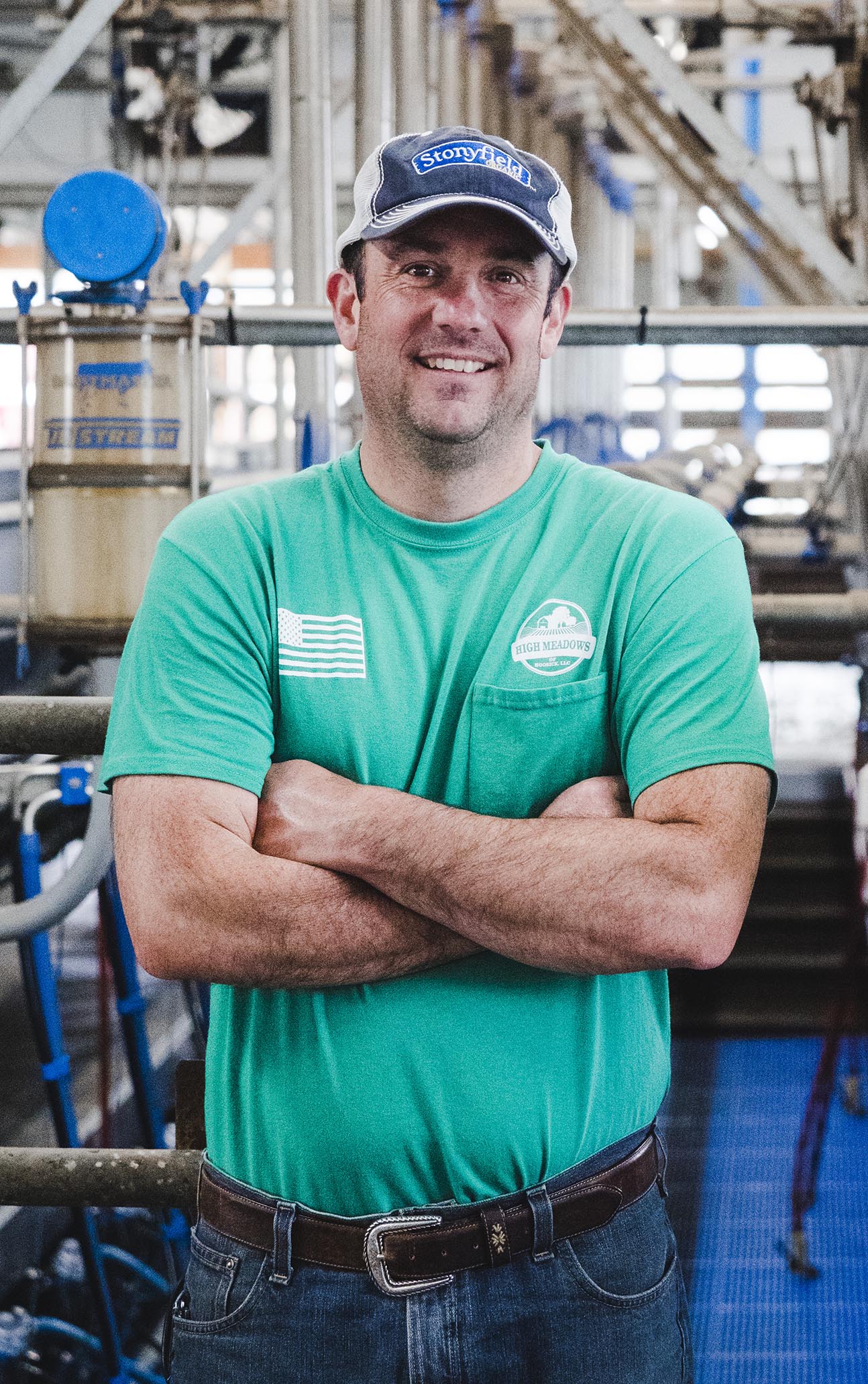
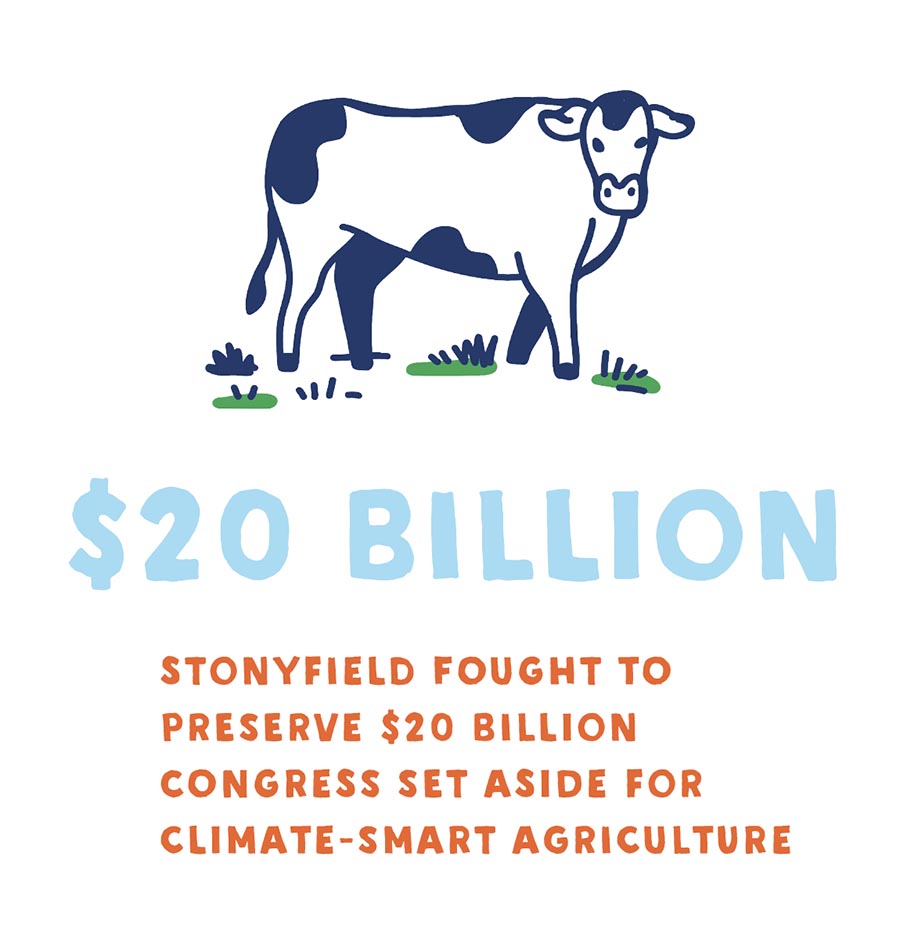

BETTER POLICIES FOR BETTER ORGANIC FOOD
Stonyfield strongly advocates in favor of public policy to support organic farming, including vital research. In 2024, we worked successfully with Sen. Tammy Baldwin, D-Wis., to include support for organic farmers in the draft farm bill. Baldwin ensured that the bill draft included grants to develop organic market infrastructure, like food processing and storage, to help connect organic farmers with consumers. Although this farm bill draft ultimately did not pass in 2024, we will continue advocating for these kinds of policies. Despite majority opposition in Congress, we fought to preserve $20 billion set aside for climate-smart agriculture as part of the Inflation Reduction Act signed into law in 2022. Also in 2024, we helped convince the USDA to release a second round of funding to help support organic dairy farmers hit by high organic feed costs through the Organic Dairy Market Assistance Program. We will always work to improve rules and regulations that make great food even better.



“As environmental safeguards are rolled back across the country, the responsibility to protect our health and our planet falls more heavily on all of us. At Stonyfield, we remain steadfast in our commitment to healthy farms, healthy communities, and a healthy planet.”
![]()
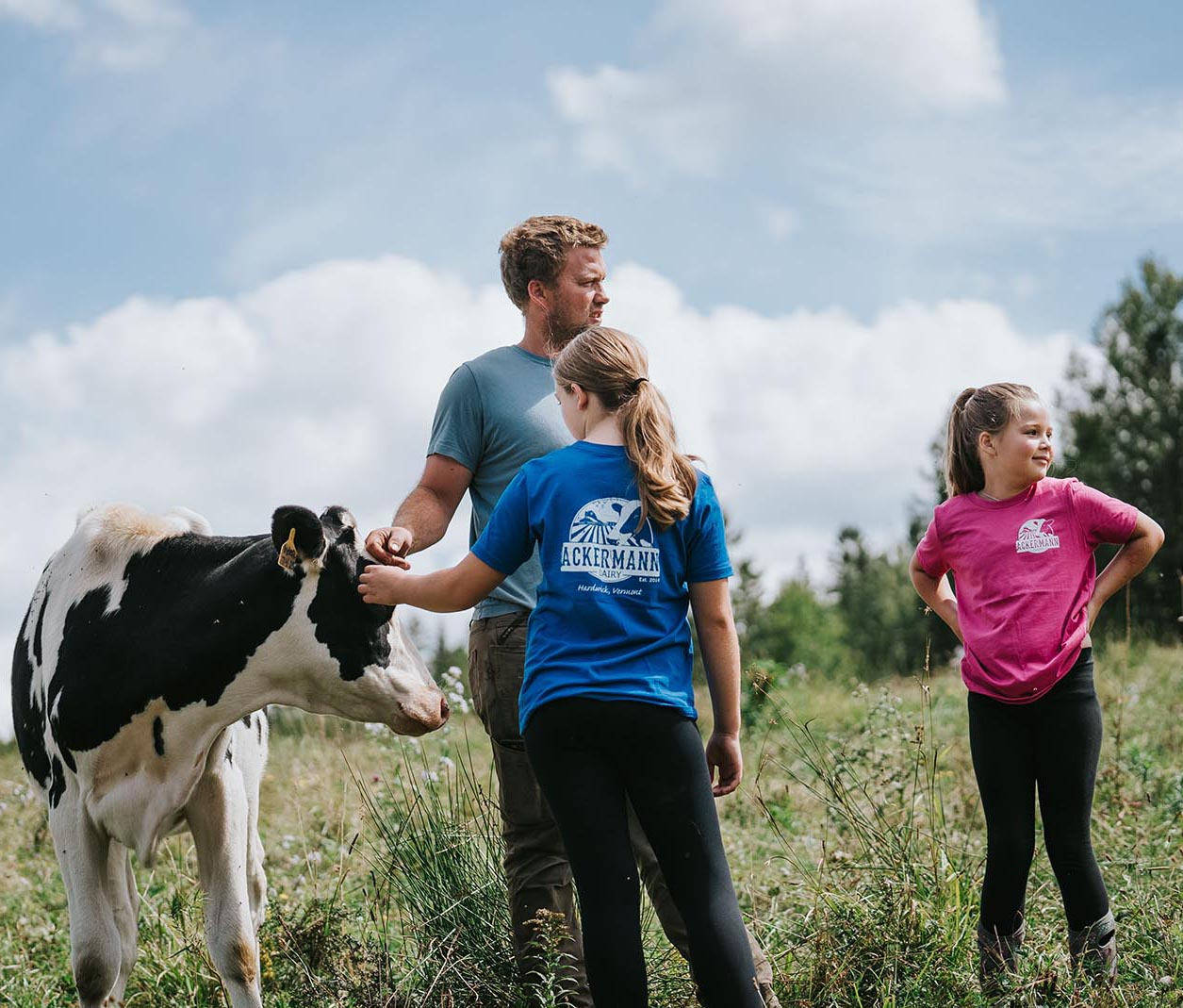

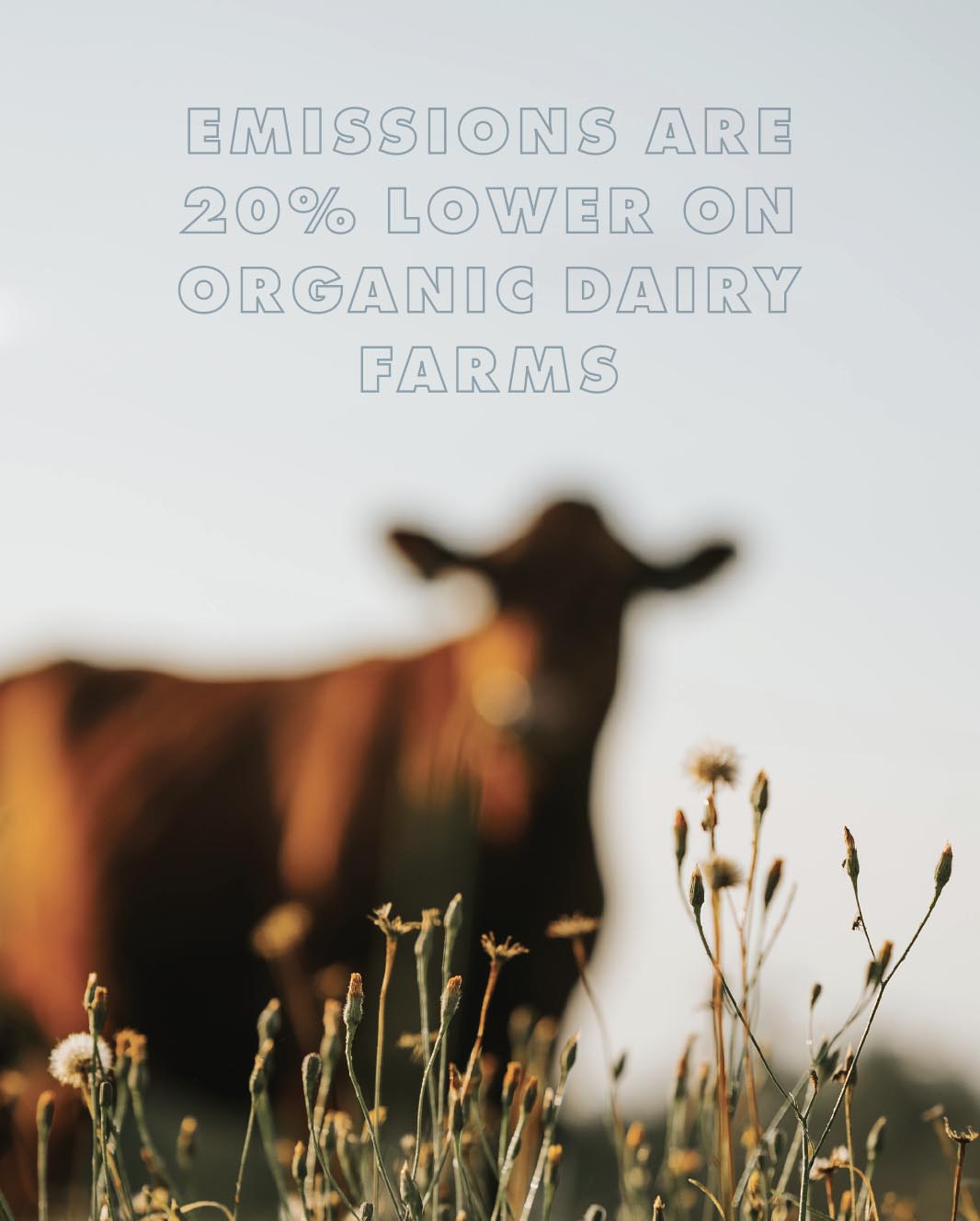
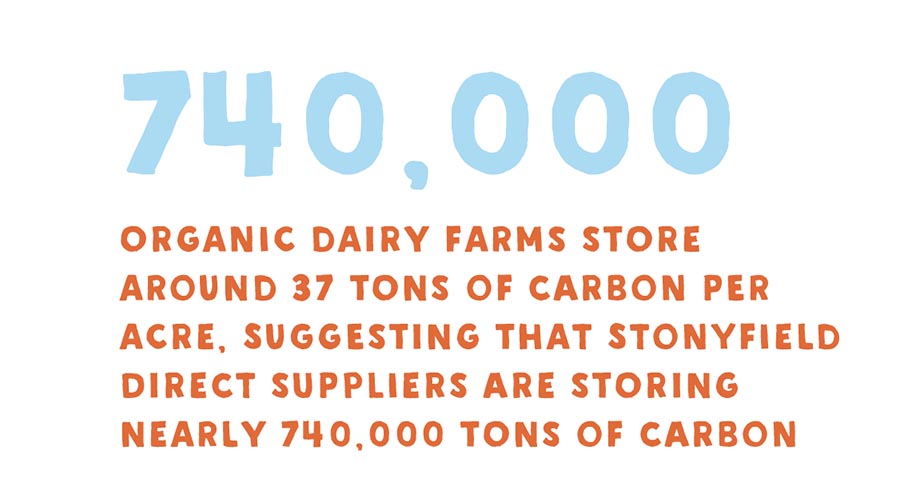
ORGANIC SOIL AT STONYFIELD SUPPLIER FARMS GOBBLES UP CLIMATE-WARMING CARBON
Plants and microorganisms in organic pastures suck carbon from the air and store it in healthy soil. A recent study showed greenhouse-gas emissions are 20 percent lower on organic dairy farms compared to conventional dairy farms. Our studies show organic dairy farms store around 37 tons of carbon per acre, suggesting that our direct suppliers are storing nearly 740,000 tons of carbon that is not in the air and warming our planet. That’s equal to the weight of 75 Eiffel Towers. Yay healthy soils!
“Over the years we discover more powerful benefits of organic farming that help protect our environment in ways we did not dream of decades ago.”
![]()
ORGANIC SOIL AT STONYFIELD SUPPLIER FARMS GOBBLES UP CLIMATE-WARMING CARBON
Plants and microorganisms in organic pastures suck carbon from the air and store it in healthy soil. A recent study showed greenhouse-gas emissions are 20 percent lower on organic dairy farms compared to conventional dairy farms. Our studies show organic dairy farms store around 37 tons of carbon per acre, suggesting that our direct suppliers are storing nearly 740,000 tons of carbon that is not in the air and warming our planet. That’s equal to the weight of 75 Eiffel Towers. Yay healthy soils!



“Over the years we discover more powerful benefits of organic farming that help protect our environment in ways we did not dream of decades ago.”
![]()
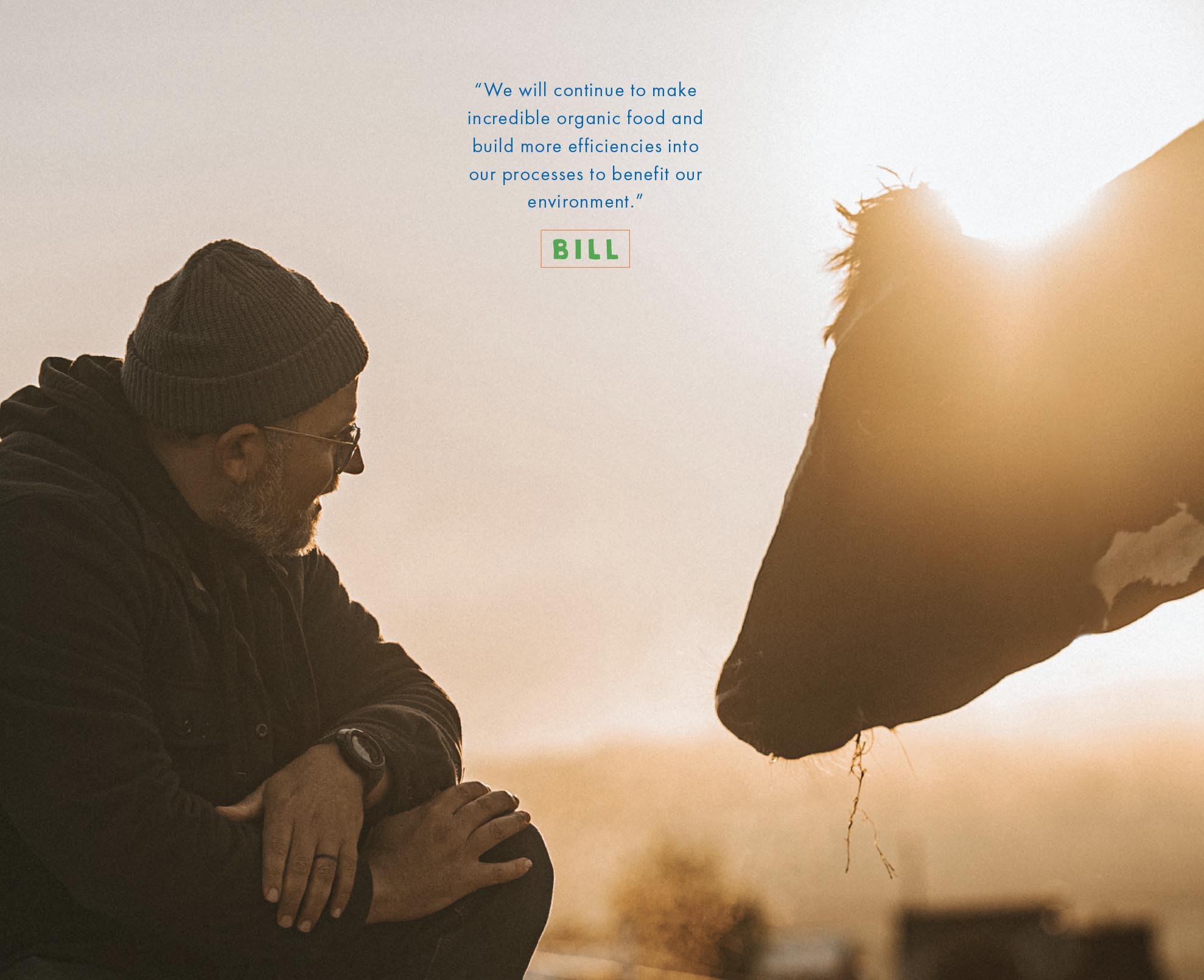
NEW YOBABY YOGURT POUCHES CUT PLASTIC AND EMISSIONS
In 2024 Stonyfield launched a new mono-material design for its YoBaby yogurt pouches. The new design requires 11 percent less plastic than the prior version, with a new lightweighted cap that cuts plastic use by 17 percent. These numbers add up: Our plastic use on YoBaby yogurt pouches in 2024 went down by 10 tons, and manufacturing these lighter pouches reduced our greenhouse-gas emissions on these products by 73 tons compared to plastic use and emissions attributable to the prior design. We did the work with the help of a $300,000 grant from the Dairy Business Innovation Center. This is a great step for YoBaby yogurt. The lighter-weight caps were so successful that we expanded them to more of our pouch products, providing an additional savings of 16 tons of plastic and 53 tons of CO2 emissions.
“At Stonyfield, reducing our plastic use as our company gets bigger is how we like to grow.”

STONYFIELD’S LONDONDERRY PLANT LOWERS EMISSIONS
Stonyfield upgraded the air compressor system at our Londonderry manufacturing facility in 2024, helping us pursue our goals to reduce the direct and indirect greenhouse gas emissions from our flagship plant. Like many manufacturers, we use machines that compress air to power equipment and tools. Air compressors also incidentally generate heat. The new compressors are better in two ways: first, they are more efficient; second, we engineered a system to capture and use that heat byproduct for use in other plant operations, like pre-heating water, or to provide heat for the facility. This project is estimated to reduce energy consumption at the plant by 624,677 kWh per year. Every bit helps.
STONYFIELD AIMS TO CUT GREENHOUSE GASES WHERE IT REALLY COUNTS
Most of the greenhouse-gas emissions associated with our operations don’t come from producing yogurt. Indeed, our carbon footprint in 2023 was around 500,000 metric tons of carbon dioxide, but 98 percent originated from “indirect” sources. That’s science talk for emissions that don’t come from sources owned by Stonyfield but originate across the value chain of the business. For example, data show 66 percent of our emissions come from the farms that supply our milk, and another 32 percent come from other supply chain activities like packaging and transporting goods. That’s where we can and will make the biggest positive impact and where we will work to reduce our carbon footprint in the years to come. It’s all about the farming.
“We know that organic farming isn’t just the key to great products, it’s where Stonyfield will make our biggest advances toward protecting our environment as well.”
![]()
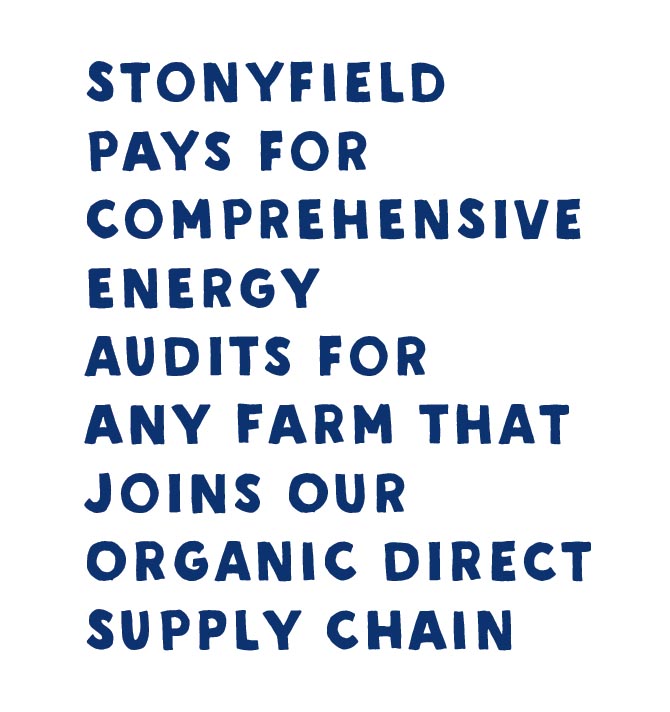
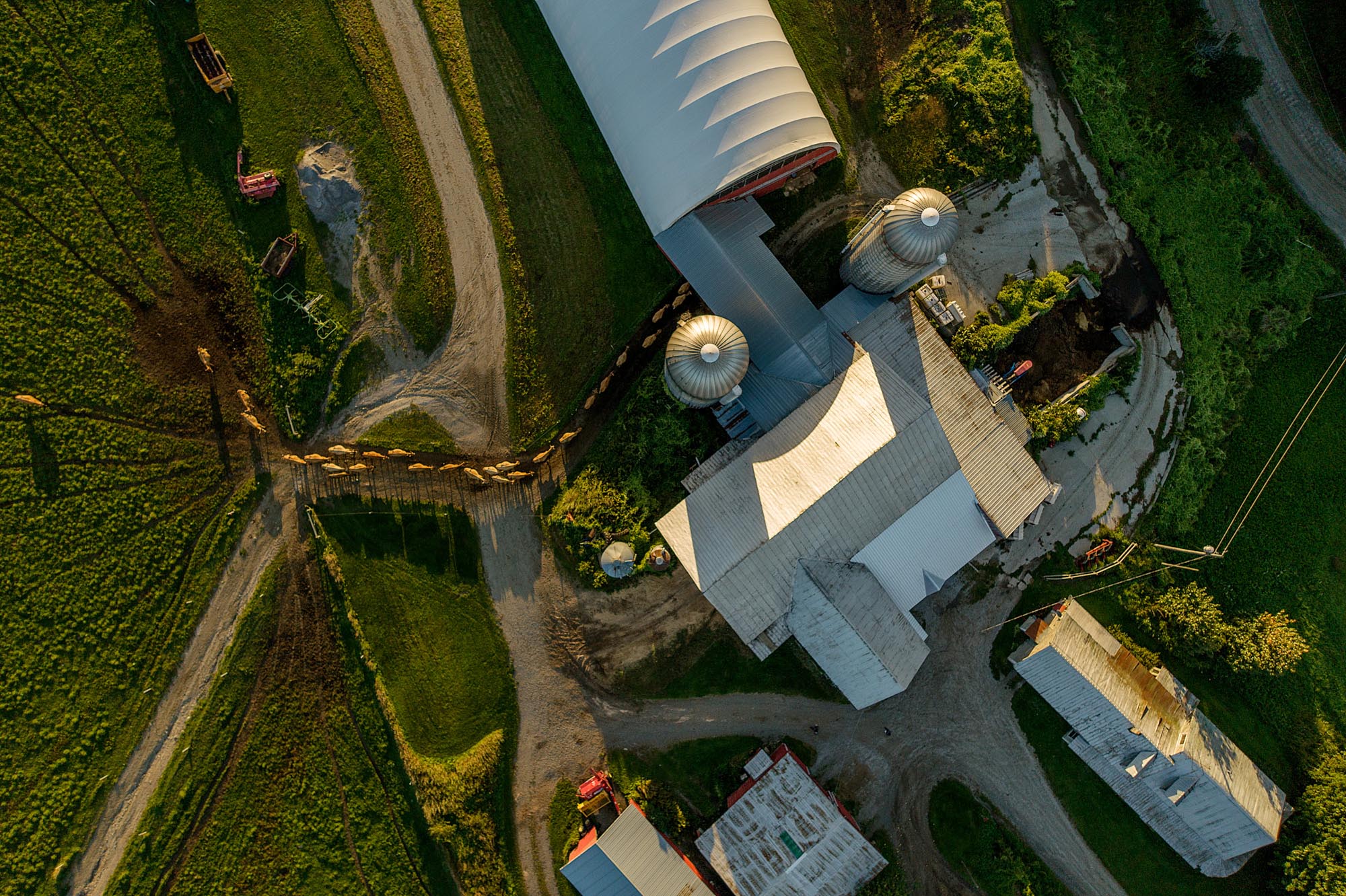

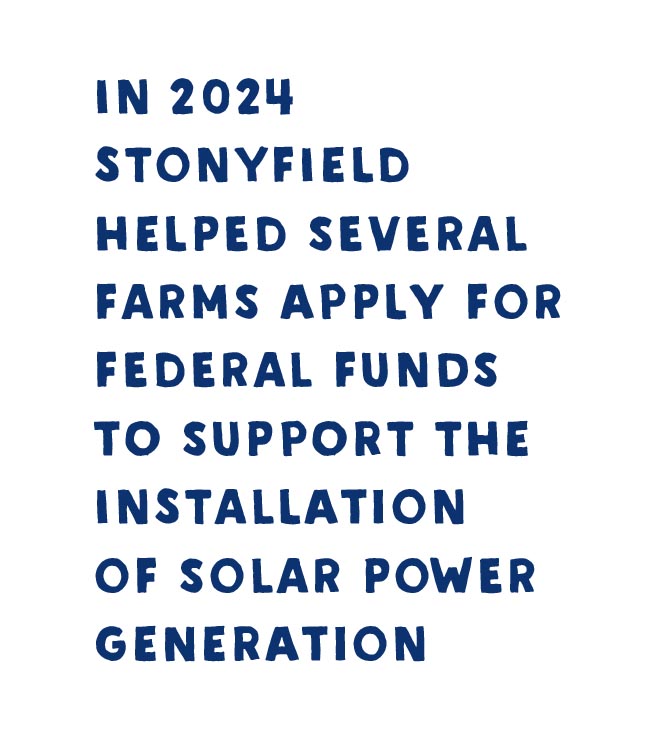
STONYFIELD HELPS NEW SUPPLIER FARMS CONSERVE ENERGY
We often have the biggest positive environmental impact when we work hand-in-glove with organic dairy farms across our supply chain. That includes saving energy. We pay for comprehensive energy audits for any farm that joins our organic direct supply chain, crafting a roadmap for saving energy on each farm. We then help those farms identify grant opportunities to fund improvements that realize those energy savings. Energy audits can also be the first step toward the use of solar power at these organic farms. In 2024, we helped several farms apply for federal funds to support the installation of solar power generation. It’s a win for the farms and a win for the planet.
“You can’t manage what you can’t measure, and an energy audit can measure how an organic farm can save the most energy.”

STONYFIELD HELPS NEW SUPPLIER FARMS CONSERVE ENERGY
We often have the biggest positive environmental impact when we work hand-in-glove with organic dairy farms across our supply chain. That includes saving energy. We pay for comprehensive energy audits for any farm that joins our organic direct supply chain, crafting a roadmap for saving energy on each farm. We then help those farms identify grant opportunities to fund improvements that realize those energy savings. Energy audits can also be the first step toward the use of solar power at these organic farms. In 2024, we helped several farms apply for federal funds to support the installation of solar power generation. It’s a win for the farms and a win for the planet.
“You can’t manage what you can’t measure, and an energy audit can measure how an organic farm can save the most energy.”





SUPPORT FOR THE COMMUNITIES IN THE STONYFIELD FAMILY
Stonyfield supports healthy communities, including the New England towns we call home. We made over $1 million in charitable donations in 2024 (including both cash and product donations) to help support the communities and people we love. In 2024, the Organization for Refugee and Immigrant Success (ORIS) received $30,000 to support their work connecting refugee and immigrant communities with fresh, healthy food — including $20,000 directly to their mobile market program. We also donated $10,000 to support the New Hampshire Conservation Law Foundation’s environmental justice initiatives in Manchester and Nashua. These are just a few examples of Stonyfield spreading the love locally.

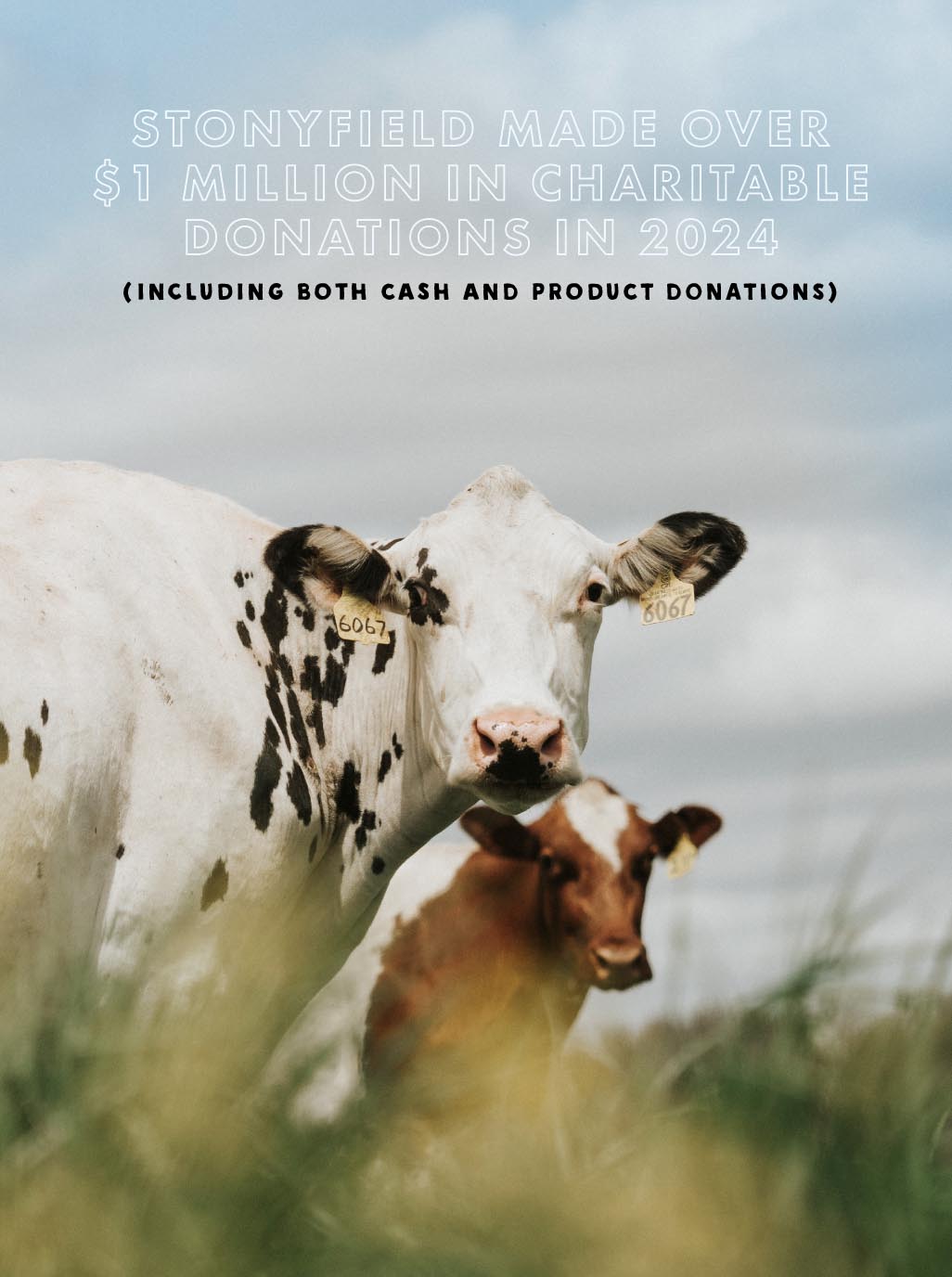

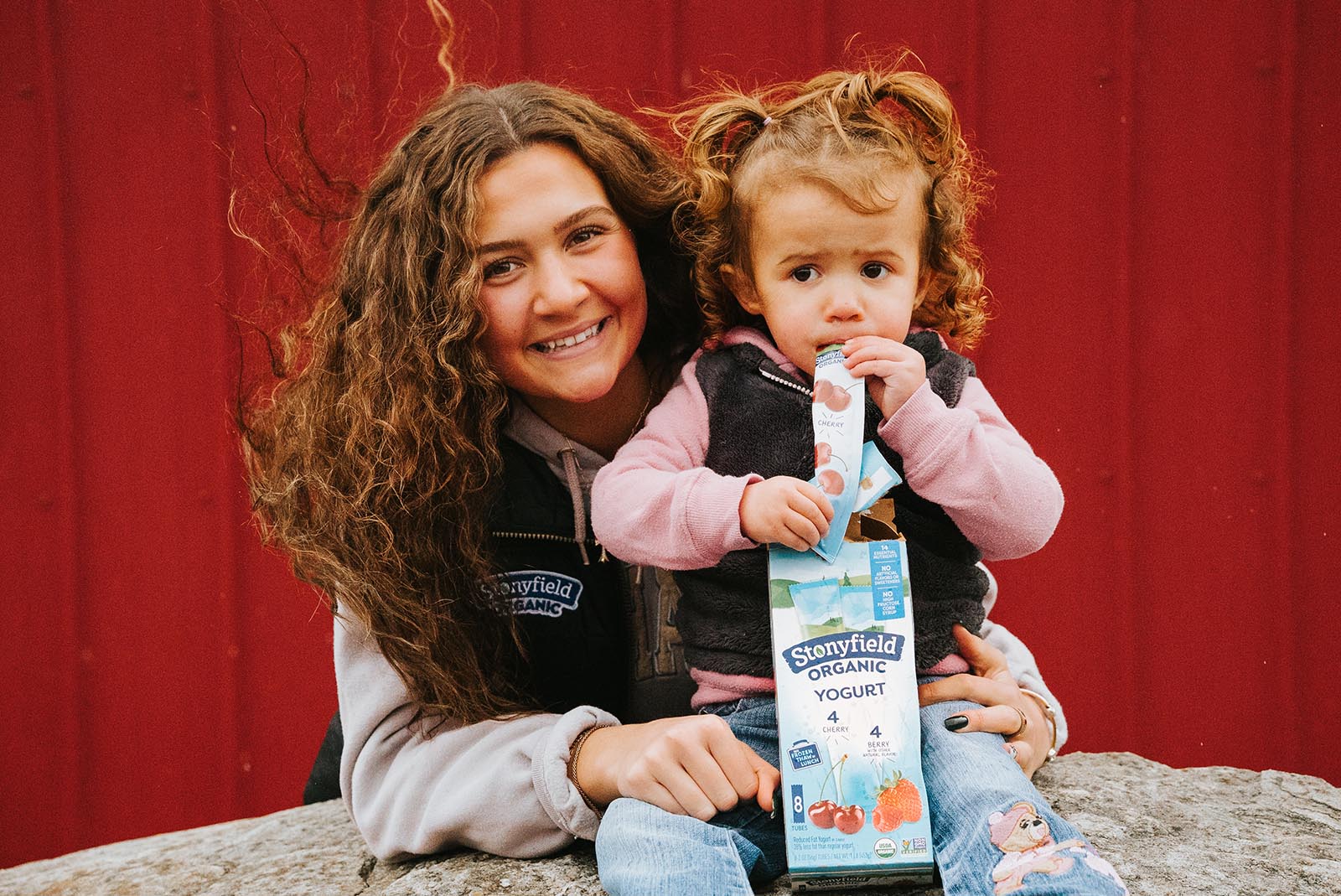
“Celebrating $1 million in giving is a great milestone for us. It is part of our job in the communities we call home.”
![]()
SUPPORT FOR THE COMMUNITIES IN THE STONYFIELD FAMILY
Stonyfield supports healthy communities, including the New England towns we call home. We made over $1 million in charitable donations in 2024 (including both cash and product donations) to help support the communities and people we love. In 2024, the Organization for Refugee and Immigrant Success (ORIS) received $30,000 to support their work connecting refugee and immigrant communities with fresh, healthy food — including $20,000 directly to their mobile market program. We also donated $10,000 to support the New Hampshire Conservation Law Foundation’s environmental justice initiatives in Manchester and Nashua. These are just a few examples of Stonyfield spreading the love locally.



“Celebrating $1 million in giving is a great milestone for us. It is part of our job in the communities we call home.”
![]()

EVEN WITH GROWTH, STONYFIELD PLANS TO CUT GREENHOUSE-GAS EMISSIONS OVER THE LONG TERM
Stonyfield’s absolute greenhouse-gas emissions increased from 2022 to 2023 as our company grew and markedly increased the organic acreage managed by our supplier farms. This rise of nearly seven percent in emissions also corresponded with increasing Stonyfield sales. We know that our emissions reduction targets are ambitious, and our progress toward meeting those goals is nonlinear — particularly as we get bigger. We regularly review and refine our plans to meet emission-reduction targets, with a careful eye toward long-term goals. In late 2024, we updated our targets to reduce greenhouse-gas emissions in coordination with the Science Based Targets initiative (SBTi), an international collaboration to prevent global warming from surpassing the 1.5 degrees Celsius mark, a goal from the Paris Agreement.
Using 2022 as a baseline, we have committed to a 36 percent reduction by 2030 across the areas impacted by the SBTi. We have also committed to zero deforestation across our supplier network by the end of 2025. The SBTi has validated that the science-based greenhouse-gas emissions reductions targets submitted by Stonyfield conform with the SBTI Criteria and Recommendations (Criteria version 5.2) and the SBTi Forest, Land and Agriculture Guidance.
One example of the steps we are taking to advance our long-term goals is helping our direct-supply farms complete a greenhouse-gas assessment once every three years. This effort helps monitor and identify opportunities for emissions reductions among our organic farm suppliers, thereby supporting our deep, long-term commitment to reduce greenhouse-gas emissions across our operations, from our direct-supply organic farms all the way to the breakfast table.
THE OFFICIAL NEAR-TERM SCIENCE-BASED TARGET LANGUAGE:
ENERGY AND INDUSTRY
Stonyfield Organic commits to reduce absolute scope 1 and 2 GHG emissions 42 percent by 2030 from a 2022 base year.* Stonyfield Organic also commits to reduce absolute scope 3 GHG emissions from purchased goods and services, fuel and energy related activities, upstream transportation and distribution and waste generated in operations 42 percent within the same timeframe. *The target boundary includes land-related emissions and removals from bioenergy feedstocks.
FLAG
Stonyfield commits to reduce absolute scope 3 GHG emissions 30.3 percent by 2030 from a 2022 base year.* Stonyfield also commits to no deforestation across its primary deforestation-linked commodities, with a target date of December 31, 2025. *Target includes FLAG emissions and removals.
“We learn more every year how we can make the biggest reductions in greenhouse gas emissions by working hand-in-glove with farmers to fully unleash the benefits of organic techniques for our warming planet.”
![]()
STONYFIELD 2024 IMPACT REPORT BY THE NUMBERS
20,000
Acres of organic farmland managed by Stonyfield direct suppliers (around 15,000 football fields). Up from 16,000 acres last year.
10 TONS
Stonyfield’s reduction in plastic use on YoBaby yogurt pouches in 2024 due to a new lighter-weight mono-material design.
$175,000
In 2024, Stonyfield made available more than $175,000 to our direct supplier farms for significant upgrades.
20%
A recent study showed greenhouse-gas emissions are 20 percent lower on organic dairy farms compared to conventional dairy farms.
$10,000
Stonyfield also donated $10,000 to support the New Hampshire Conservation Law Foundation’s environmental justice initiatives.
73 TONS
The reduction in Stonyfield’s greenhouse-gas emissions (CO2) on YoBaby yogurt pouches due to the new design.
740,000
Organic dairy farms store around 37 tons of carbon per acre, suggesting that Stonyfield direct suppliers are storing nearly 740,000 tons of carbon.
$4,000
The amount of technical assistance we make available to small farms that join the Stonyfield family for improvements each year.
696, 000 KILOWATT HOURS
The reduction in energy use achieved by replacing fluorescent lighting on production floors, in offices, labs, and warehouses with energy-efficient LED lights. That’s a 60 percent reduction(!) or the equivalent of taking over 60 homes off the U.S. energy grid.
$1 MILLION
Our charitable donations in 2024 (including both cash and product donations).
$30,000
The donation to the Organization for Refugee and Immigrant Success (ORIS) to support their work connecting refugee and immigrant communities with fresh, healthy food.
$20 BILLION
Stonyfield also fought to preserve $20 billion Congress set aside for climate-smart agriculture.
9 FARMS
In 2024, nine New England organic farms joined the Stonyfield team.
100%
The percentage of Stonyfield dairy technicians that received training on proper animal welfare practices.
20,000
Acres of organic farmland managed by Stonyfield direct suppliers (around 15,000 football fields). Up from 16,000 acres last year.
20%
A recent study showed greenhouse-gas emissions are 20 percent lower on organic dairy farms compared to conventional dairy farms.
10 TONS
Stonyfield’s reduction in plastic use on YoBaby yogurt pouches in 2024 due to a new lighter-weight mono-material design.
$10,000
Stonyfield also donated $10,000 to support the New Hampshire Conservation Law Foundation’s environmental justice initiatives.
73 TONS
The reduction in Stonyfield’s greenhouse-gas emissions (CO2) on YoBaby yogurt pouches due to the new design.
$175,000
In 2024, Stonyfield made available more than $175,000 to our direct supplier farms for significant upgrades.
740,000
Organic dairy farms store around 37 tons of carbon per acre, suggesting that Stonyfield direct suppliers are storing nearly 740,000 tons of carbon.
$4,000
The amount of technical assistance we make available to small farms that join the Stonyfield family for improvements each year.
$30,000
The donation to the Organization for Refugee and Immigrant Success (ORIS) to support their work connecting refugee and immigrant communities with fresh, healthy food.
696, 000 KILOWATT HOURS
The reduction in energy use achieved by replacing fluorescent lighting on production floors, in offices, labs, and warehouses with energy-efficient LED lights. That’s a 60 percent reduction(!) or the equivalent of taking over 60 homes off the U.S. energy grid.
$20 BILLION
Stonyfield also fought to preserve $20 billion Congress set aside for climate-smart agriculture.
9 FARMS
In 2024, nine New England organic farms joined the Stonyfield team.
$1 MILLION
Our charitable donations in 2024 (including both cash and product donations).
100%
The percentage of Stonyfield dairy technicians that received training on proper animal welfare practices.

